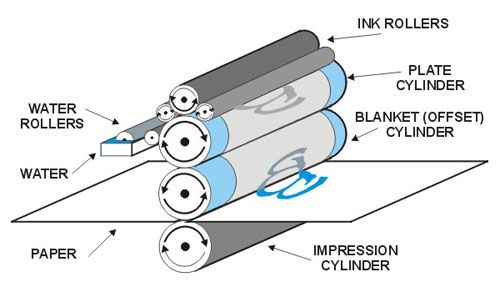Sustainable and Environmentally-Conscious Options in litho printing
Sustainable and Environmentally-Conscious Options in litho printing
Blog Article
A Comprehensive Guide to Comprehending Litho Printing Methods
The globe of litho printing, a strategy stemming from the late 18th century, is an interesting mix of history, science, art and development. Remain with us as we trip right into the captivating world of litho printing.
The Historical Evolution of Litho Printing
The historic trajectory of litho printing, a crucial innovation in the realm of interaction, is a fascinating story of human ingenuity. The process evolved with the introduction of the rotating press, which substantially boosted efficiency. Each stage of litho printing's development showcases humankind's unrelenting pursuit of effectiveness and top quality in aesthetic communication.
Translating the Scientific Research Behind Litho Printing Inks
Relocating forward in the exploration of litho printing strategies, the focus now moves to the scientific research behind litho printing inks. The composition of these inks, their drying out process, and color mixing methods form the backbone of this complex art type. Understanding these elements is essential to grasping the craft and accomplishing the wanted print results.
Make-up of Litho Inks
In lithographic printing, the essential role of litho inks can not be overemphasized. The composition of litho inks differs depending on its function, yet normally, they consist of two major components - pigments and automobiles. Pigments, the color-providing components, are finely ground bits suspended in the vehicle, a fluid that lugs the pigment onto the printing surface area. The car is a complicated blend of solvents, oils, and resins, which affect the ink's drying out time, bond, and gloss. Additionally, numerous additives are present to improve specific homes like flow, drying, and resistance to ecological results. Each component plays a vital part in the last print's top quality, making the precise solution of litho inks a complex science.
Ink Drying Refine
From the composition of litho inks, attention transforms to the fascinating process of ink drying. 2 primary techniques are used in litho printing: oxidative drying out and absorption. Absorption, on the various other hand, involves the ink seeping right into the paper fibers, which is a quicker procedure but can lead to much less dynamic shades.
Shade Combining Methods
While the drying process plays a crucial duty in litho printing, the scientific research of shade mixing strategies holds equal relevance. The scientific research behind litho printing inks additionally takes right into account the openness of the ink, which impacts just how colors overlay and mix.
The Art and Style Elements in Litho Printing
Litho printing takes a breath life into art and style with its special components. The process includes creating a photo on a lithographic sedimentary rock plate or steel plate with a smooth surface area. The image is then published onto a tool, usually paper, by moving the ink from the plate. What sets litho publishing apart is its capacity to reproduce complex layouts with high integrity, making the outcome practically identical to the initial artwork. This is achieved via the use of various line strategies such as cross-hatching, stippling, and hatching, which allow for a series of tonal results. Litho printing accommodates a selection of shades, enabling musicians to create dynamic and vibrant prints. This combination of precision and adaptability makes litho printing a recommended option for many musicians and designers.
Modern Applications of Litho Printing Strategies
Litho printing strategies have found comprehensive usage in the modern commercial field. Its impact and significance continue to expand with the development of brand-new advancements and technologies in the field. This section will explore these contemporary applications and the transformative role they play in the printing market.
Industrial Litho Printing Makes Use Of
Litho printing stays a vital part of the commercial sector. High-volume printing tasks, such as the production of books, newspapers, and packaging, rely on litho printing for its ability to provide premium picture high quality and cost performance. Litho printing also provides a broad shade range, remarkable to that of digital printing.
Innovations in Litho Printing
Pushing the borders of typical methods, contemporary advancements have actually fueled a host of innovations in litho printing. These breakthroughs have not only boosted the quality and effectiveness of litho prints but additionally broadened its application extent. One famous growth is digital important site litho printing, which combines the virtues of electronic innovation with litho's high-quality outcome. This hybrid model provides faster configuration times, lowered waste, and enables on-demand printing. One more significant improvement is the introduction of ecologically pleasant inks. These inks, made from vegetable or soy-based solutions, have significantly decreased the sector's ecological influence. litho printing. In addition, the growth of sophisticated plate modern technology has streamlined the printing procedure, resulting in sharper images and boosted color fidelity. These technologies underscore the enduring importance of litho printing in the modern world.
Discovering the Process of Litho Printing: Action by Step

Challenges and Solutions in Contemporary Litho Printing

In spite of the accuracy and practice that litho printing happily upholds, it is not without its set of modern obstacles. Digital litho printing permits for cost-efficient short runs and easy personalization, attending to the concern of variable data. Thus, while there are difficulties, the litho printing sector is proactively adapting to satisfy them head-on, ensuring its significance in the future.
Final thought
In verdict, litho printing, with its abundant history and clinical details, holds a considerable place in the print sector. The future of litho printing pivots on its ability to adjust to these transforming demands, verifying its long-lasting value in an evolving market.

Report this page